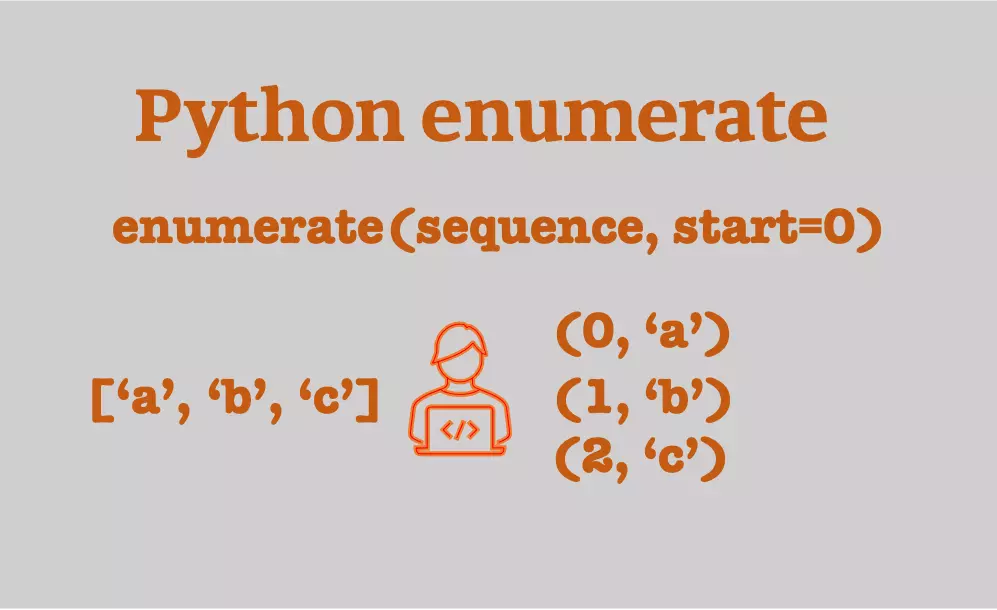Python enumerate to simplify the looping

Python enumerate
enumerateis a built-in function in Python (introduced in Python 2.3).enumerateallows iterating over the objects that support iteration such as a list.enumeratetakes two parameters and its syntax is:enumerate(sequence, start=0). It returns enumerate object containing a tuple of incremental index values and associated items.- The advantage of the enumerate object is that the index values and items can be accessed at the same time. It helps to write cleaner and easy-to-read code (more Pythonic way).
enumerate list
- Create the enumerate object from the list and traverse using for loop
# Python3 (Python 3.7.4)
x = ['python', 'R', 'julia']
for tup in enumerate(x):
print(tup)
# output
(0, 'python')
(1, 'R')
(2, 'julia')
# get index and values separately
for ind, value in enumerate(x):
print(ind, value)
# output
0 python
1 R
2 julia
By default, the index values start at 0. The starting index value can be changed to 1 or to any other value.
x = ['python', 'R', 'julia']
# enumerate with start at 1
for tup in enumerate(x, 1):
print(tup)
# output
(1, 'python')
(2, 'R')
(3, 'julia')
Get list-of-tuples or tuple-of-tuples of index values and items from the enumerate,
x = ['python', 'R', 'julia']
# get of list-of-tuples
list(enumerate(x))
# output
[(0, 'python'), (1, 'R'), (2, 'julia')]
# get of tuple-of-tuples
tuple(enumerate(x))
# output
((0, 'python'), (1, 'R'), (2, 'julia'))
Enumerate can traverse only once
- The list to
enumerateobject generates iterator which can be traversed only once
x = ['python', 'R', 'julia']
enum = enumerate(x)
list(enum)
# output
[(0, 'python'), (1, 'R'), (2, 'julia')]
# try again
list(enum)
# output
[]
To iterate it multiple times, wrap the enumerate to container object such as a list or use in for loop (see above
examples)
Enumerate dictionary
- enumerate the dictionary for both keys and values
x = {1:'python', 2:'R', 3:'julia'}
for ind, (key, value) in enumerate(x.items()):
print(ind, key, value)
# output
0 1 python
1 2 R
2 3 julia
Enumerate strings
- Iterate each character in a string using enumerate
for ind, value in enumerate('python'):
print(ind, value)
# output
0 p
1 y
2 t
3 h
4 o
5 n
Enumerate example
enumerateis useful to iterate over multiple lists when the index is useful- For example, if you want to find the index of lists when items from two list matches
x = ['python', 'R', 'julia']
y = ['java', 'go', 'python']
for ind1, item1 in enumerate(x):
for ind2, item2 in enumerate(y):
if item1 == item2:
print(ind1, ind2)
# output
0 2
Enhance your skills with courses on Python and pandas
- Python for Data Analysis: Pandas & NumPy
- Mastering Data Analysis with Pandas: Learning Path Part 1
- Data Analysis Using Python
- Python for Everybody Specialization
References
Learn more about R
This work is licensed under a Creative Commons Attribution 4.0 International License
Some of the links on this page may be affiliate links, which means we may get an affiliate commission on a valid purchase. The retailer will pay the commission at no additional cost to you.

